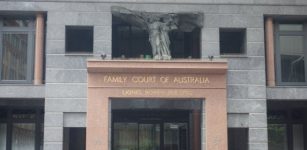Family Law System Grants Access to Child Sex Offenders

Abbey Hamersley was only 17 years old when her mother found her dead in her room, after having taken her own life. The young woman had been suffering depression and anorexia, before she lost her will to live in November 2013.
Just five months before her death, Abbey reported that she had been sexually abused for years as a child. It wasn’t until her teenage years that she understood what had happened to her at the hands of someone close.
The allegations were reported to Western Australian police, but Abbey committed suicide before charges were laid.
Visitation rights lead to tragedy
Abbey’s father was sentenced to four years prison in 2005 for sexually assaulting his daughter’s 8-year-old best friend. When he was released on parole two years later, he wasn’t allowed to return to his work as a dentist, but was granted visitation rights by the Australian family law system.
Gill Hamersley felt pressured into consenting to the court orders that allowed visitation. She was advised that if she were to deny Abbey’s father access, it could damage her daughter. And if she proceeded to a contested hearing, it could result in more restrictive orders.
A statement was later released by the Family Court of Australia to the effect that Abbey’s case had never been heard before the court and the orders were made with Gill’s consent.
Sadly, the court sent Ms Hamersley a letter ten days after Abbey’s death stating that the department had assessed Abbey’s father as abusive, and had decided to deny him any further unsupervised contact. But it was all too late.
Calls for an inquiry into the family law system
Now Gil Hamersley, in conjunction with Bravehearts, is leading a campaign for a Royal Commission into the Family Law System of Australia. They’ve started an online petition calling for the inquiry, which has garnered over 51,000 signatures to date.
In a letter Ms Hamersley wrote to accompany the petition, she says that the legal system is actually giving convicted child sex offenders access to children, rather than protecting our youth.
“The family law policy of wanting kids to have a “meaningful relationship with both parents” drove the decision making that would eventually lead to the death of my darling girl,” she wrote.
Abbey’s Project
Bravehearts is a child sexual assault awareness organisation with a focus on prevention. They recently released a report of an independent inquiry into the experiences of families in their dealings with the family courts.
The report title Abbey’s Project identifies fourteen more case studies where children have been put into the care of a parent or carer, who’s either been convicted or under suspicion of child sex offences.
In most of the cases, the crimes were carried out against their own children and yet they were still given unsupervised access.
The report found that one in five children in Australia are sexually harmed in some way before their eighteenth birthday. And 80 percent of survivors don’t purposely disclose their sexual abuse until adulthood. This is often due to the fear they won’t be believed, and feelings of shame and self-blame.
Research has found that child sex offenders can often be rehabilitated. But within 15 years of being released from prison, 16 percent of offenders classed as low risk reoffend, while 53 percent of high risk offenders commit another crime.
Amendments to the Family Law Act
Under the provisions of the 1975 Commonwealth Family Law Act, decisions regarding children are supposed to be in the child’s best interest.
In 2006, an amendment was made to the Act requiring judges to make decisions ensuring children have a meaningful relationship with both parents, while at the same time protecting the child.
Abbey’s Project found that, “the court is more than often unwilling to make a finding of unacceptable risk due to the limitations this may make on change in the future relationship between the alleged offender and the child.”
The report recommends that courts should not focus on maintaining relationships at all costs.
In 2013, Bravehearts requested that the Royal Commission into Institutional Responses to Child Sexual Abuse broaden its scope to include the Australian family law system. But as the commission was unable to do this, the organisation is now calling for a separate inquiry.
Meeting with the PM
There is hope of a Royal Commission into the family law system. Executive director of Bravehearts, Hetty Johnston, met with Australian prime minister Malcolm Turnbull on October 20 this year.
Ms Johnston presented the PM with the petition calling for the commission, as well as the Abbey’s Project report. Mr Turnbull acknowledged there are serious issues confronting the family law system, and promised to consider their findings.
The Australian family law system “is not geared to listen to children, let alone hear them and respond accordingly,” Ms Johnston told the Australian. “Instead it responds to the parent with the most influence, money and manipulative powers.”
However, Diana Bryant, chief justice of the Family Court of Australia, criticised the petition claiming it had inaccuracies based on Ms Hamersley’s desperate pleas on behalf of her daughter.
Ms Johnston countered the criticisms of the chief justice, explaining it was not disputed that in Abbey’s case, the correct court proceedings were followed. She clarified that “it is the culture and policy that drive the process that is the issue at hand”.
Inherent in the culture
Bravehearts is not the only one calling for reform of the family court system. Dr Claire Ferguson, lecturer in forensic criminology at the Queensland University of Technology (QUT), has been investigating divorce cases where allegations of child sexual abuse have been made.
The doctor found that in 2013, the family courts threw out almost all of these allegations. According to Ms Ferguson, it is quite rare to have an allegation of a sexual assault that is proven to be false. “So there’s a bit of a question of why the family court is unsubstantiating all of these allegations,” she told the ABC last month.
Molly Dragiewicz, associate professor at QUT, is also involved in the debate. She argues that the family law court is sceptical about allegations of child sexual abuse, as there’s a view that the breakdown of a marriage “is the catalyst for a report of abuse that’s not genuine.”
Angela Lynch, a lawyer at the Women’s Legal Service, believes the allegations are going unsubstantiated because the court is focused on granting both parents access to a child.








